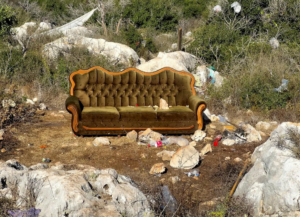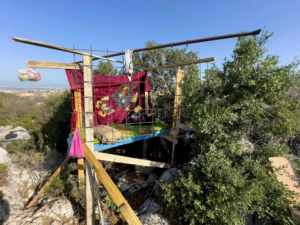This is what life looks like for illegal Palestinian workers in Israel right now

A sofa salvaged from a landfill, in one of the shanty camps where Palestinians laborers hide during the night.
Fadi Amun (Shomrim) reports in Haaretz on 23 January 2025:
For more than 30 years, the vexing issue of Palestinian residents of the West Bank illegally entering Israel in order to work has been on the agenda of various Israeli governments – and still, no long-term policy has been formulated. No matter who is in power, Israeli policy has fluctuated wildly and unpredictably over the years.
Every so often, the number of permits issued to Palestinians seeking work within Israel is slashed for so-called security reasons (“Allowing laborers into Israel is dangerous,” it is often argued). Paradoxically, the same security reasons are frequently cited when the government increases the number of permits, maintaining that allowing workers into Israel, and the money they earn from this, helps to keep the West Bank calm.
During the current war, which began with the October 7 attack by Hamas, the government has prevented the 150,000 Palestinians who hold valid permits – from Gaza and the West Bank – from entering Israel. Unsurprisingly, the effects were an exact repeat of what happened during previous rounds of conflict: construction sites in Israel grounded to a halt and the government’s efforts to bring in foreign workers to fill the void proved to be unsuccessful.
The Palestinian workers, for their part, waited a while for the gates to reopen and, when they did not, had no choice but to enter Israel illegally, given the scarcity of jobs in the West Bank.
No Israeli official is willing to estimate how many Palestinians currently work in the country illegally, though many have a sense that infiltrating Israel is harder now than in the past, because the short-lived government of Naftali Bennett and Yair Lapid took active measures to rectify the porous nature of the West Bank separation barrier.
It is believed that the number of workers illegally entering Israel is significantly lower than the estimated 40,000 who did so before the outbreak of the war.
One figure Shomrim did manage to obtain, thanks to a freedom of information request submitted by the Movement for Freedom of Information in Israel, provides some indication: according to the Israel Police, between October 7, 2023, and the end of December 2024, around 15,000 cases were opened against Palestinians entering illegally.
However, there is almost certainly a significant number of Palestinians who were detained and deported to the West Bank without any official police proceedings, and no one can say what proportion they make up of the total number of Palestinians in Israel illegally.
Inhumane conditions
Palestinians who decide to take the risk and enter Israel find themselves in a hugely complex situation. The wages they receive from Israeli employers have plummeted, because Israelis are worried about hiring them, and their living conditions are extremely harsh.
“If it were not for the fact that I have a family and children who I need to provide for, I would prefer to kill myself and not have to live like this,” one daily worker tells Shomrim tersely. The worker, who waits long before sunrise for an employer to come and pick him up from the edge of the nature reserve where he hides out overnight, refuses to elaborate.

A shack build among trees, in one of the encampments
Another Palestinian worker Shomrim spoke to while he was waiting for his employer is Abu Hatem. He is a 57-year-old resident of a village in the West Bank, who has a speech impediment. He has four adult children and has worked in Israel for most of his life. The day after October 7, he tells Shomrim, the entry permit he has held for 17 years was annulled. Left with no alternative, he sneaks into Israel and returns to his village once a month to give his family the money he has earned.
Abu Hatem says that he suffers from health issues and that his current living conditions are exacerbating the situation. Along with other workers, he hides out at night in shacks built in open spaces using leftover construction material, plastic sheeting and cardboard boxes.
Every few days, he says, they dismantle the shacks and relocate, concerned that hikers will report them to the police. They do not have even the most basic sanitation, and the winter rain and cold make conditions unbearable. According to Abu Hatem, some workers have suffered from hypothermia. A waterproof tarpaulin from the landfill, he says, is a valuable commodity.
At another pre-dawn pick-up point, Yazan – who is just 15-years-old – is waiting for his employer. Yazan is from Hebron and has been in Israel illegally for several months. “I work in renovations,” he says. “It’s usually demolition, or stacking concrete blocks and mixing cement. There’s no regular work; every day I work for someone different. At best, I work for the same manager for a week and then they tell me there’s no more work.
“The situation is dire and I am suffering greatly. What I want is to work, to earn money to send to my mother and my family back home. I don’t want this war. It’s made my life a living hell.”
Yazan says that he asks for 400 shekels (approximately $105) for an eight-hour workday, but that he would accept as low as 300 shekels. During the workday, he adds, he is typically given a light lunch, such as schnitzel in pita bread, shawarma or falafel. Before returning to his nighttime hideout, he buys a packaged cake and fills up two bottles of water, which he uses for drinking and bathing.
He spends his evenings on his cell phone, which he charges during the day on whatever construction site he ends up on. “It’s freezing at night. There are wild boars, porcupines and snakes. On a really good night, I will get between three and four hours of sleep.”
In some of the makeshift camps that have sprung up, some workers are related to each other. These connections not only help them deal with the loneliness and the cold, but also with more practical issues, such as being able to leave possessions and money with a trusted relative who is not working on a specific day.
A 17-year-old Palestinian youth, who sleeps in one such camp, tells Shomrim that he is in Israel with his father and a few cousins, all of whom from the Samaria area of the West Bank. He says that he was smuggled into Israel several months ago and paid the driver who assisted him 1,500 shekels (around $420).
After October 7, Israel revoked the work permits of 150,000 Palestinian laborers from the West Bank and Gaza.Credit: Fadi Amun
“We’re like mice and the police are like cats. They try to catch us and we run away,” he says. “We can guess by now where and when they will come, so we hide in the hills. If one of us is caught, they never give authorities the name of the employer. The employer is the one providing us with an income, so we’re not going to spit into the plate we eat from. So, we safeguard the trust between us and the employer, who provides us with work that is almost nonexistent in the West Bank.”
The youth’s cousin, a 19-year-old resident of Hebron, tells a similar story. He has been working since he was 14 – mainly in flooring and plastering. He entered Israel some two months ago through a gap in the separation barrier. From there, he was collected by a driver who charged 1,000 shekels ($260) to take him to the shacks where his relatives were living.
Since then, he says, he has taken any job offered to him in order to support his mother and siblings. “All in all, there are about 20 people in each shanty camp. Every couple of months, two or three will go back to the West Bank to their families. Conditions here are very tough: it’s cold, there are wild animals and the police are chasing us.”
Slave wages don’t entice locals
While the Palestinian workers are somewhat reluctant to be interviewed, the Israelis who employ them are even more wary. After much persuasion, one building contractor from northern Israel agreed to speak to Shomrim – but only anonymously. He says that he has no choice but to employ Palestinians who entered Israel illegally – otherwise his business would simply collapse.
For many years before the outbreak of the current war, he says, he employed Palestinians with permits. When the government rescinded those permits in the aftermath of October 7, he was left without workers. “There are very few construction workers in Israel, and those that do exist want the kind of salary that I cannot afford to pay them. I had no choice but to take the risk of hiring unlicensed workers from the West Bank.”
He tells Shomrim about the construction projects that have come to a standstill due to a shortage of workers and how this has caused a sharp rise in costs – he estimates it to be around 50 percent – for the end customer. Despite this, he admits he is still struggling to turn a profit.
“Without skilled workers, I can’t stay in this profession – and without the Palestinians, there simply aren’t any skilled workers,” he adds. At the same time, he distances himself from any responsibility for the conditions in which Palestinian workers live. “They receive a daily wage in cash. They sleep rough, and I’m neither responsible nor accountable for them,” he states.
Are you not afraid of being caught employing Palestinians with no work permit?
“Of course I’m afraid. But what can I do?”
Shomrim asked the Israel Police for comment and was referred to the Israeli military.
The IDF Spokesperson stated: “Security forces are taking extensive measures to safeguard the border communities and are making every effort to curb crossings from the West Bank through various means – including offensive operations targeting illegal crossings, the use of various technological tools, and increasing the number of forces stationed.”
This report was first published by Shomrim, the Center for Media and Democracy.
This article is reproduced in its entirety
